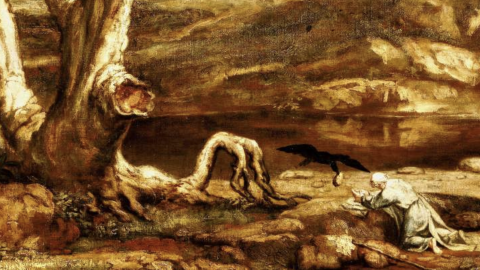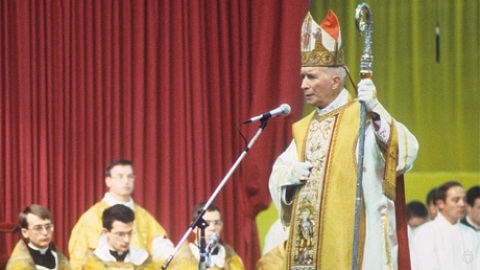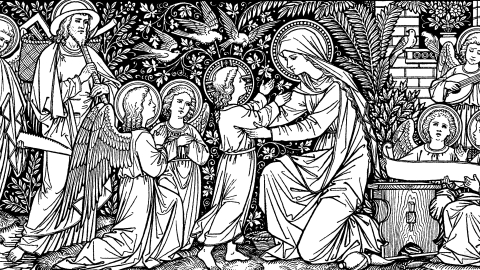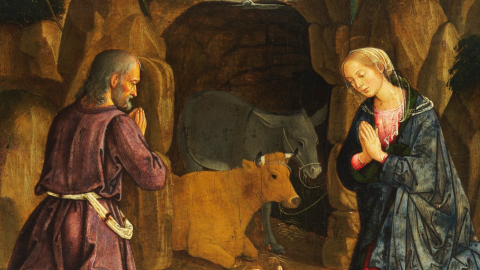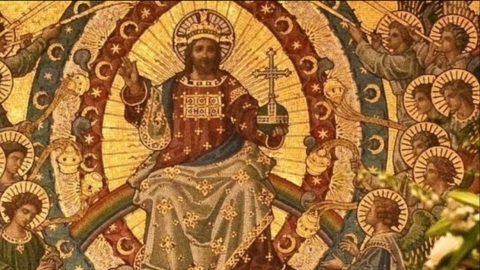Archbishop Lefebvre’s Letter for Lent on Penance

Archbishop Marcel Lefebvre
From FSSPX NEWS, 14 February 2024
On February 14, 1982, for Lent, Archbishop Marcel Lefebvre wrote a letter addressed to the faithful of Tradition in order to encourage them to maintain a penitential spirit and the traditional practices.
Dearest faithful,
According to an ancient and salutary tradition in the Church, on the occasion of Lent, I address to you these few words in order to encourage you to enter with all your soul into this time of penitence, with the dispositions willed by the Church and to accomplish the purpose for which the Church prescribes it.
If I look in the books of the beginning of the century for the ends for which the Church prescribed this time of penance, they indicate three of them:
1. First to repress the concupiscence of the flesh
2. Then to facilitate the elevation of our souls toward divine realities
3. Finally, to make satisfaction for our sins.
Is this not the example Our Lord shows us in the course of His life here below? Pray and do penance. But having neither concupiscence nor sin, He did penance and made satisfaction for our sins, thus showing us that our penance can be beneficial not only for us, but for our fellow man.
Pray and do penance. Doing penance in order to pray better, in order to draw closer to God. This is what all the saints have done, and what the Virgin Mary reminds us of in all her messages.
Will we dare to say this necessity is less great in our age than in previous ages? We can and must, on the contrary, affirm that never more than today have prayer and penance been necessary, because everything has been done to diminish and despise these two fundamental elements of Christian life.
Have we ever sought, as today, to satisfy without any limit all the disordered instincts of the flesh, even going as far as murdering millions of innocents? We would likewise believe that society has no other reason for existing other than to give the maximum “standard” of living to all men, in order to protect them from any deprivation of material goods.
In this way the aim of society would be opposed to what the Church prescribes. And we understand that in these times, when men of the Church align themselves with the spirit of the world, we witness the disappearance of prayer and penance, and particularly for the reparation of sins and of obtaining forgiveness for faults. Who today likes to repeat the moving psalm of Miserere and to repeat with the Psalmist Peccatum meum contra me est semper: “My sin is always before me”? And how can a Christian soul not move away from the thought of sin if the image of the crucifix is always before his eyes?
The bishops asked the Council for a reduction of fasting and abstinence that these prescriptions have practically disappeared. We must recognize that this disappearance is a consequence of the ecumenical and Protestant spirit which denies the necessity of our participation for the application of the merits of Our Lord to each of us, for the remission of our sins, and the restoration of our divine filiation.
While in the past the commandments of the Church expected:
-- obligatory fasting for all the days of Lent except Sundays, for Ember days, and several vigils;
-- abstinence on all the Fridays of the year, the Saturdays of Lent, and in many dioceses, all Saturdays of the year.
What remains of these prescriptions today?
-- fasting on Ash Wednesday and Good Friday;
-- abstinence on Ash Wednesday and Fridays of Lent.
We can ask ourselves: why such a reduction?
Who are those required to fast?
-- Adults aged 21 to 60 years old. [In the United States, the minimum age is 18. - Ed.]
Who must observe abstinence?
-- All the faithful starting from the age of 7 are required to abstain. [The current law holds that this rule applies the day after a Catholic's 14th birthday. - Ed.]
What is fasting? This is only to have one meal per day, to which it is permitted to add two collations, one in the morning and one in the evening, not exceeding two ounces, or 60 grams of solid food. [The Archbishop refers here to the European order of meals; in the United States, dinner is the evening meal and the food measurements are not applied. - Ed.]
What is abstinence? It is abstaining from meat.
The faithful who truly have the spirit of faith and who profoundly understand the Church’s motives, which were indicated above, will have at heart not only to fulfill these light prescriptions of today, but entering into the spirit of Our Lord and the Virgin Mary, they will bear the sins that they have committed and those of their fellow man, their family, their friends, their fellow citizens.
This is why they will add to these prescriptions either fasting on all Fridays of Lent, or abstaining from alcohol or wine, or they will abstain from television. They strive to pray more, to assist at holy Mass more often, to recite the Rosary, and not to miss evening prayer with the family. They will part with superfluous goods in order to help seminaries, found schools, help their priests in the arrangement of chapels, and help the development of religious houses.
The prescriptions of the Church do not only concern fast and abstinence, but also the Easter duty.
Here is what the Capitular Curate of Sion recommended to the members of his diocese on February 20, 1919:
1. During Lent, the parish priests will make the Way of the Cross twice each week: one day with the schoolchildren, another day with the other parishioners. After the Way of the Cross, they will recite the Litany of the Sacred Heart.
2. In Passion Week--that is to say, the Week before Palm Sunday--there will be triduum in all the parish churches. Instruction -- Litany of the Sacred Heart in the presence of the Blessed Sacrament -- Benediction. In these three instructions, the parish priests will remind their parishioners simply and clearly what the principal conditions are for receiving the sacrament of penance worthily.
3. The time during which one can fulfill the Easter duty is fixed for all parishes from the Passion Sunday to the first Sunday after Easter. [Today, the Easter duty typically runs from Easter Sunday to Pentecost Sunday. - Ed.]
Why would these directives no longer be valid today?
Let us make the most of this salutary time during which Our Lord is wont to dispense abundant graces. Let us not imitate the foolish virgins who, not having oil in their lamps, found the door of the bridegroom’s house closed and heard this terrible response Nescio vos: I do not know you.
Blessed are the poor in spirit, for theirs is the kingdom of Heaven; that is to say, the spirit of detachment from the goods of this world.
Blessed are they that mourn, for they shall be comforted. Let us think of Jesus in the Garden of Olives, who wept for our sins. It is now for us to weep for our own and those of our brothers.
Blessed are those who hunger and thirst after justice, for they shall have their fill. Sanctity goes through the cross, penance, and deprivation. If we truly seek perfection, we must follow the Way of the Cross.
This Lent, may we hear the call of Jesus and Mary and join in following them in this crusade of prayer and penance.
May our prayers, our supplications, our deprivations obtain from heaven that the leaders of the Church return to its true and holy traditions, the only solution for the institutions of the Church to revive and flourish again.
Let us enjoy repeating this conclusion of the Te Deum: In te Domine speravi, non confundar in aeternum: In Thou, O Lord, have I placed my hope; I will never be disappointed.
+ Marcel Lefebvre
Former Archbishop of Tulle
Founder of the Priestly Society of Saint Pius X
